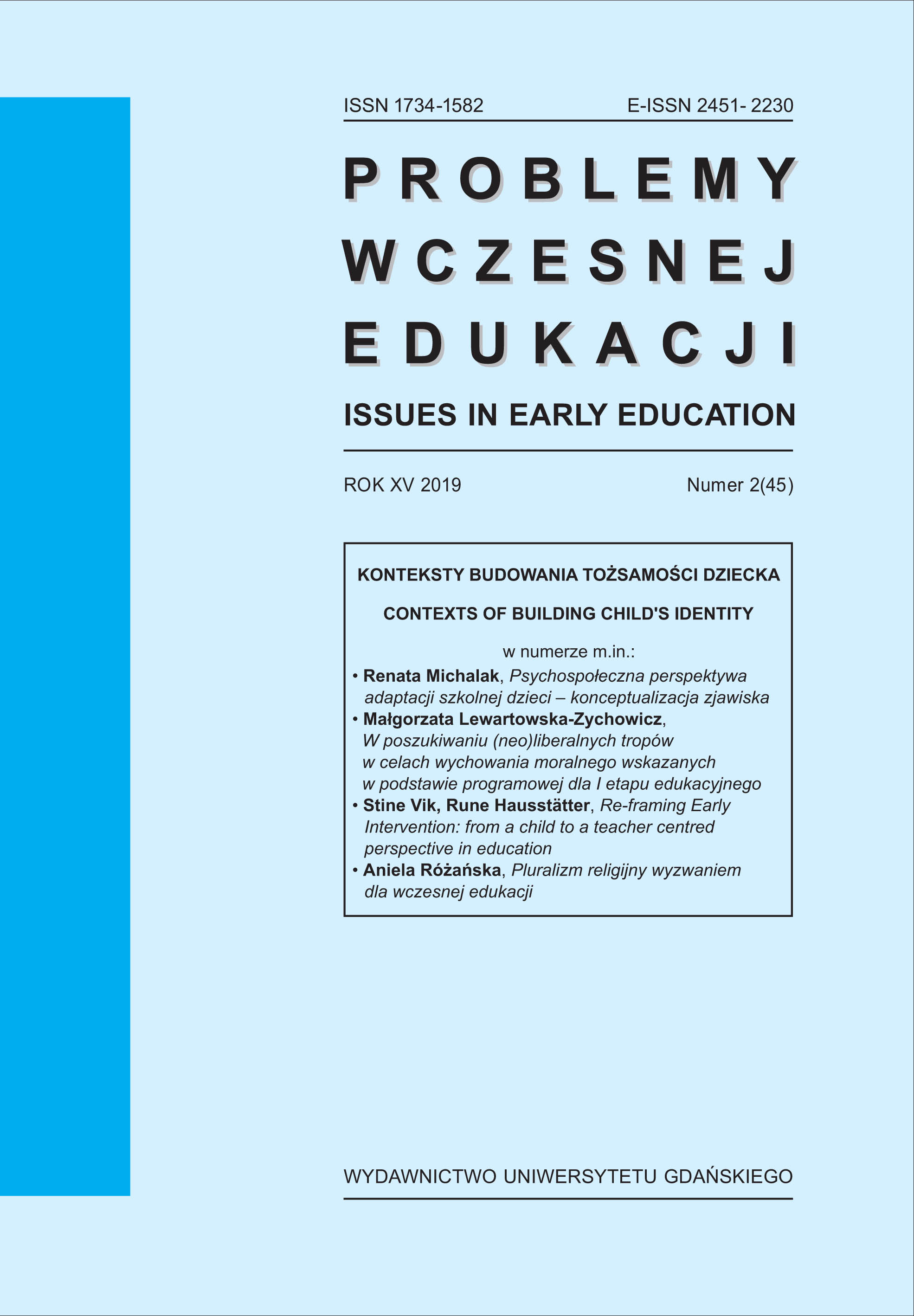Niemieckie podręczniki do nauczania religii jako środki kształtowania tożsamości religijnej dziecka w wieku młodszoszkolnym
DOI:
https://doi.org/10.26881/pwe.2019.45.06Słowa kluczowe:
nauczanie religii, tożsamość religijna, podręcznik szkolnyAbstrakt
The issue raised in the text concerns the role that German textbooks for religious instruction play in shaping the identity of a child from the initial classes. The first part defines the key concept: religious identity. Modern contexts of religious socialization and the resulting challenges to the educational process were also recalled. In the second part, based on the results of the analysis of textbooks, the conclusion about the positive meaning of these books was formulated as a means of supporting the development of the individual and social aspect of the child’s religious identity and shaping a reflective and at the same time affirmative attitude towards religion.
Downloads
Bibliografia
Berger P., Luckmann T. (1983), Społeczne tworzenie rzeczywistości.Warszawa, PIW.
Dobbelare K. (2012), Socjologiczna analiza definicji religii. W: W. Piwowarski (red.), Socjologia religii antologia tekstów. Kraków, Nomos.
Drobinski M., Schulte von Drach M. (2016), Wiesich der Religionsunterricht in Deutschland verän-dert hat. “SüddeutscheZeitung”, 14 Juni 2016. https://www.sueddeutsche.de/bildung/schule-wie-sich-der-religionsunterricht-in-deutschland-veraendert-hat-1.2987758.
Herbatski A. (2015), Tożsamość religijna a bezpieczeństwo konfesyjne: współczesne wyzwania (na przykładzie republiki Białoruś). „Pogranicze. Studia Społeczne”, 25.
Höhne T. (2005), Schulbuchwissen. Umrisse einer Wissens – und Medientheorie des Schulbuches. Frankfurt am Mein, Hergestellt Books an Demand GmbH.
Kobzarska-Bar B. (2012), Tożsamość niemiecka w nowym tysiącleciu; leitkultur a islam. „Świat Idei i Polityki”, 12(14).
Krasowska J. (2013), Religia jako czynnik wpływający na tożsamość narodową Polaków. „Studia Sandomierskie: Teologia, Filozofia, Historia”, 20/21.
Milerski B. (2003), Pedagogika religii. W: Z. Kwieciński, B. Śliwerski (red.), Pedagogika. Podręcznik akademicki, t. 1. Warszawa, Wydawnictwo Naukowe PWN.
Pankalla A., Wieradzka A. (2014), Ponowoczesna tożsamość religijna młodych Polaków z perspektywy koncepcji Jamesa Marcii i Koena Luyckxa. „Annales Universitatis Paedagogicae Craco-viensis. Studia Sociologica”, 6.
Piechniczek T. (2015), Kultura i religijność w życiu miejskiej społeczności lokalnej. Socjologiczne studium przypadku. Kłodnica w Rudzie Śląskiej. Katowice, Studio Noa Ireneusz Olsza.
Polkowska A. (2001), Analiza dyskursu w badaniach zjawisk społecznych. W: I. Kurcz, J. Bobryk (red.), Psychologiczne studia nad językiem i dyskursem. Warszawa, Wydawnictwo Instytutu Psychologii PAN.
Różańska A. (2009), Dylematy kształtowania tożsamości religijnej młodzieży a edukacja religijna. W: M. Libiszowska-Żółtkowska (red.), Tożsamości religijne w społeczeństwie polskim. Socjologiczne studium przypadków. Warszawa, Difin.
Schweitzer F. (2005), Religiöse Identitätsbildung. W: P. Schreier, U. Sieg, E. Volker (hrsg.), HandbuchInterreligiöses Lernen. Guterslöh, Gutersloher Verlagshaus.
Szczyrba S. (2001), Tożsamość religijna czy osobowa? Przyczynek do filozofii dialogu międzyreligijnego i międzywyznaniowego. „Łódzkie Studia Teologiczne”, 10.
Wieradzka-Pilarczyk A. (2015), Tożsamość religijna młodych Polaków. Próba zastosowania koncepcji Koena Luyckxa w obszarze rozwoju religijnego. Poznań, Wydawnictwo Uniwersytetu im. Adama Mickiewicza.
Zalewska E. (2013), Obraz świata w podręcznikach szkolnych do klas początkowych. Gdańsk, Wydawnictwo Uniwersytetu Gdańskiego.
Zalewska E. (2018). Dialog jako podstawowy wymiar relacji w sferze sacrum i profanum w niemieckich podręcznikach do edukacji religijnej, „Przegląd Religioznawczy”, 3.
Analizowane podręczniki
Bismillah – Wir endecken den Islam (2012), Arbeitsheft 1/2, Weinheim, Schroedel Verlag.
Bismillah – Wirendecken den Islam (2012), Arbeitsheft 3, Wienheim, Schroedel Verlag.
Bismillah – Wirendecken den Islam (2012), Arbeitsheft 4, Weinheim, Schroedel Verlag.
Die Reli-Reise 1/2. Lehrwerkfür den evangelischen Religionsunterricht (2012), Stuttgart–Leipzig, Ernst Klett Verlag.
Die Reli-Reise 3/4 Lehrwerk für den evangelischen Religionsunterricht (2012), Stuttgart–Leipzig, Ernst Klett Verlag.
Fragen – suchen – entdecken 1/2. Katolische Religion in der Grundschule (2015), Stuttgart–Leipzig, Klett Verlag.
Fragen – suchen – entdecken 3/4. Katolische Religion in der Grundschule (2015), Stuttgart–Leipzig, KlettVerlag.
Kinder fragen nach dem Leben 1/2. Religionsbuch für die Grundschule (2018), Berlin, Cornelsen Verlag.
Kinder fragen nach dem Leben 3/4. Religionsbuch für die Grundschule (2018), Berlin, Cornelsen Verlag.
Miteinander auf dem Weg 1/2. Islamischer Religionsunterrich (2012), Stuttgart, Ernst Klett Verlag.
Miteinander auf dem Weg 3/4. Islamischer Religionsunterricht (2012), Stuttgart, Ernst Klett Verlag.
Spurenlesen. Religionsbuch für das 1/2. Schuljahr. Bayern (2016), Braunschweig, Diesterweg Verlag.
Spurenlesen. Religionsbuch für das 3/4. Schuljahr. Bayern (2016), Braunschweig, Diesterweg Verlag.

 Uniwersyteckie Czasopisma Naukowe
Uniwersyteckie Czasopisma Naukowe





